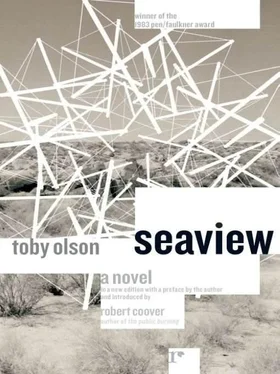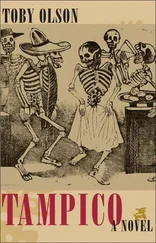But Melinda talked to him, had always done so, and he did not have the burden of being judged for missing the nature of her feelings in her behavior. He felt himself as an isolate person all the time, but Melinda broke into that with her talking; she knew how to talk, and she had learned not to ask him to reciprocate in the talking, knowing how hard a thing it was for him, and she knew that when he did speak, he meant what he said. He thought, were he to put all this into words between them, they could both say that this understanding kept them together.
“If we get to the Cape in a while, I’ll die there, and then you’ll have to figure the rest for yourself. If somehow we don’t get there, we’ll have to play it by ear. What I want to say is that I think it’s a good idea to lay it out here and now, because we could get separated, and we might not have talked. It’s not that I really have much to say to you that I haven’t said. God knows, we’ve said it enough recently. It’s just, now we’ve talked and we don’t need to feel that there were things we should have said and didn’t get to. You know what I mean?”
“I know what you mean,” he said.
“Well, is there anything you want to say? You really don’t need to. But I thought, maybe, well, this might be your chance if there were anything.”
“I can’t think of anything right now,” he said, “but it would be good for me if I held you.”
“Come on,” she said.
As he slid awkwardly along the bench to her, he felt selfish. He did have things to say to her, but he despaired of the possibility because he could not articulate them, and if he did say anything it would not be the thing he wanted to say. He knew that all talk was of this kind, but at his very core he could not participate in it, could not begin to speak his feelings. It was as if he were his feelings and utterance would be to lose that part which was uttered: small bits of his being jettisoned, dissolving in the air, like pieces of flesh cut from his arms with a paring knife, peels cast into a fire. She saw much of this as he came over to her.
“It’s all right,” she said, “it’s all right.” And like the child he was, who at bottom was dumbfounded and bewildered at the talk and behavior of adults, he came and put his head down under her arm, his ear against her warm breast above her shallow breathing, and he did a thing that was like weeping somewhere inside himself; he could not wear it on the outside. It was too much like talking, the possibility of the dumb and stupid image made real: his literal heart torn from his chest, to lie still and gushing and bloody on his shirt sleeve. But he felt very close to her, and she felt very close to him. They felt somewhat in common, because what they had removed from between them was forms. They both knew that this was what the talking and the inability to talk were designed to do; they were nothing but catalyst for this touching. He had thought to hold her, still thought he was doing so, but it was she who was holding him. She put her palm against his cheek, pressed him into her breast. He put his left hand on her knee. They sat in the open place on the top of the mountain at Independence Pass, and after a while they heard the scuffing of Bob White as he kicked a few pebbles loose on his way down from the boulders, and they released each other.
“What did you see up there?” Melinda asked him when he reached the table, and he smiled at them before he gave what he knew to be both the real and the cliche answer.
“More mountains,” he said, “higher ones.”
THEY DROPPED DOWN IN THE EAST OF THE WATERSHED into the steep cuts and the broader valleys below and headed by way of Boulder into the outskirts of Denver. They drove through the heart of the city and out the other side, down into the foothills, and made the decision to head north into Wyoming, up to Cheyenne. They got to Cheyenne at midday, saw some posters announcing a rodeo, found a motel in which they unloaded and changed, and were at the rodeo by one-thirty. They spent the afternoon watching the cowboys ride broncos and Brahma bulls and rope calves. Bob White spoke about rodeos in his neck of the woods.
At one point, between events, Allen took Melinda back to where they stabled the animals in split-rail pens, so that she could see them up close. There was a place where the pens were set in a U-shape, and by walking into the U. they were almost surrounded by them. The animals’ smell was strong, but they were not at all skittery; they seemed very placid and very wise, in a way very professional. One horse came over to the fence and put his nose on the top rail. He and Melinda felt the horse’s muzzle. It felt like kid glove, but the best part was the feel of the soft hot breath touching their palms and tickling between their fingers.
They spent the night in Cheyenne and were up and back on the road early in the morning, heading out into the flat lands of the Great Plains. They were not in a hurry, and they drove the old highways and secondary roads, passing close to farms and through small towns. In one town in Nebraska, just the other side of the Mountain — Central time-zone line, they saw a marker announcing that the local agricultural college had restored a piece of prairie as a project. An arrow on the sign pointed the direction, off the main drag, into the few blocks of residential area. The street was on the far side of the town, and they turned into it.
At first it was lined with two — and three-story brick houses from the ’twenties and ’thirties. There were large, old trees in the yards. Two blocks in, the newer, frame ranch houses started. The prairie was between two of the ranch houses, on the other side of the street. They parked across from it, got out, and went over to it.
It was less than a half-acre in size, and it too would have been a ranch house, so the plaque in front of it said, had it not been for a young professor and his class at the college. They had discovered that it was land that had, somehow, never been cultivated or farmed. They had acquired it and let it return to its natural state. It was what the Great Plains had been like at the time of the dominance of the Comanches and the coming, or attempted coming, of the Spanish. The weeds, grasses, and flowers growing in it were well over their heads when they entered it. There were paths cut through it, and they walked these, separating. Though the paths cut back across themselves, they could not see each other, even though they were often no more than a few feet apart. They sounded to each other like small animals or birds in brush, out of sight, as they came close to each other. They talked into the air to each other, over the high growth. Melinda found dew glistening on a spider web across a path and announced this, ducking carefully under it. Allen came upon very strange flowers, small and blue, on thin stalks.
“On a horse, I could see over this,” Bob White said at one point. “That’s why the Comanche succeeded. Until he didn’t,” he said.
They spent close to an hour in the prairie, humming and studying whatever they came upon. They spoke less and less as time went by. Each felt enclosed and attentive. There were telephone wires visible from the paths, up in the sky, and they used these to keep their bearing, realizing that were the wires not there, they could well get lost and turned around and confused. Melinda finished her travels first and found her way back to the mouth of the prairie. A few minutes later Bob White joined her there. After another few minutes, Melinda called out. Allen answered her, and soon they heard him coming through the paths toward them. Soon they were together again.
They passed through two more small towns and then jogged back to an old highway and traveled it for three and a half hours. Melinda slept in the corner of the backseat behind him, and Bob White read sections from Moby-Dick and studied the road atlas, giving close attention to the Eastern seaboard. Then they headed north again on two-lane country roads. At a gas stop, Allen called Richard from a phone booth to the side of the old building.
Читать дальше












